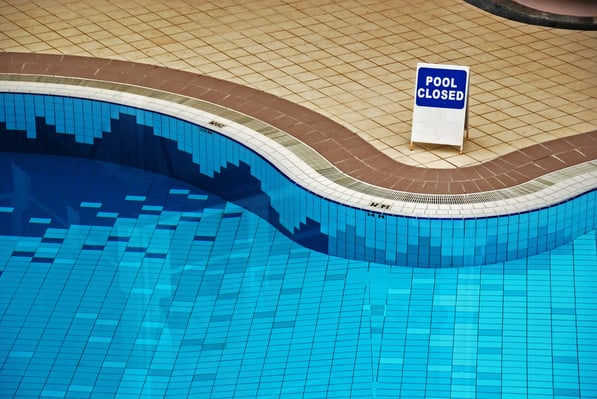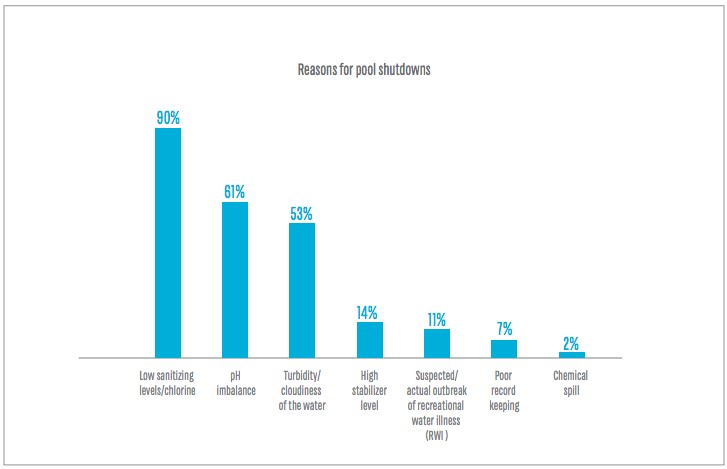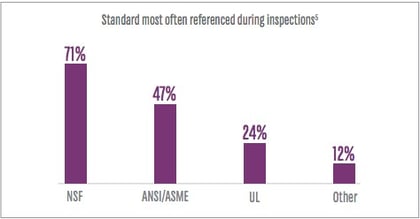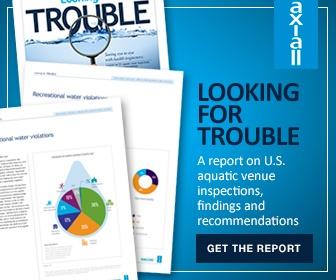If you’re a pool manager, safety and cleanliness are probably right at the top of your job description. But pool operators are also tasked with keeping the pool running and in business, period. Health inspectors play a large role in determining whether a facility must be shut down due to non-compliance or serious safety issues. Often, there is a disconnect between facility managers and the inspectors who work year-round to protect the public from water quality issues. That’s why the National Association of County and City Health Officials (NACCHO) teamed up with Westlake Water Solutions business to conduct an extensive survey on the protocols and experiences of local health departments in recreational water facility inspection. (Click here to read the “Looking for Trouble” report in full.)

Several takeaways for pool managers came out of this study. In particular, the survey offered some specific areas for pool managers to focus to help avoid a shutdown. Think it couldn’t happen to you? Consider this: 75 percent of health inspectors responded that they’ve had at least one shutdown in the past two years.
What Do Inspectors Scrutinize?
The NACCHO-Westlake Water Solutions survey revealed that nearly all pool shutdowns reported were due to one major thing: poor water quality—specifically, low levels of sanitization chemicals like chlorine.Although low sanitizing and chlorine levels have significant ripple effects, this can generally be addressed through proper use of a chlorination system like the Accu-Tab® calcium hypochlorite system, which offers consistent chlorine delivery control. Accu-Tab, when coupled with a properly functioning automated controller system, can eliminate the guessing game when it comes to sanitization levels, whether your pool is inside or outside, large or small. This provides an effective way to ensure proper sanitization.

Maintaining a safe chlorination level doesn’t just go a long way to prevent a health violation and subsequent shutdown, it also protects the safety of swimmers, staff and the physical condition of a facility by helping to prevent the growth of algae blooms, bacteria and other pathogens that can cause waterborne recreational illnesses.
Know Your Standards

According to the survey, 68 percent of local health departments inspect local recreational water facilities, evaluating each facility using a variety of standards and guidelines. The first step toward shutdown prevention is knowing what inspectors are looking for. Which standards are most commonly used during inspections? One way a pool operator can take proactive steps to prevent an unexpected shutdown is to take inventory of equipment and ensure it’s certified to NSF International standards. NSF International is a public health and safety organization that has developed over 80 voluntary public health standards accredited by the American National Standards Institute (ANSI).
You can perform a quick check on any product’s certification status by entering the product manufacturer and/or name on the NSF website (for chemical feeders, reference Flow Chemical Feeding Equipment). Also, be sure to read each product manufacturer’s instructions in full to ensure directions for operation are followed.
According to the NACCHO-Westlake Water Solutions report, 46 percent of operators never check to see if the chemical being used in the chlorination system is the same brand or chemical type specified by the manufacturer. If an inspector catches this, it will void the product’s NSF certification, potentially resulting in a shutdown if NSF Standard 50 is a requirement for operation in the state or local municipality. However, there are larger concerns, since use of an incompatible chemical could lead to a fire, explosion or other serious event.
Experience Matters
Being prepared for an inspection is a complex process--that’s why retaining staff and ensuring their familiarity with the information above is so important. One key takeaway from the NACCHO-Westlake Water Solutions survey was that staff turnover rates are inversely proportional to members’ level of knowledge about pool water, equipment and inspection requirements. The more experienced the staff, the lower the chance of shutdown.
Some facilities, like hotels and apartment communities, will always have relatively high turnover rates for employees charged with responsibility for the pool, due to the nature of their business. Unsurprisingly, these types of facilities comprised the vast majority of shutdowns, according to the report.

Educating maintenance staff at these facilities, during the onboarding process and throughout employment, is crucial. It’s not just the pool manager who must know what inspectors look for, but the whole maintenance staff.
More Than an Inconvenience
Although the vast majority of pool shutdowns only last a day or two, they’re still indicative of larger safety and health issues that can endanger swimmers, staff and the facility’s reputation.
Pool operators looking to prevent a shutdown should proactively educate staff and make copies of rules and guidelines readily available. Manufacturer recommendations should be followed carefully to ensure the proper use of all equipment and chemicals. Proper levels of sanitizing chemicals like chlorine must be maintained, and pH balance should be tested regularly. These steps are necessary investments in ensuring the safety of swimmers, staff, and a facility’s standing as a place for healthy, fun recreation.


